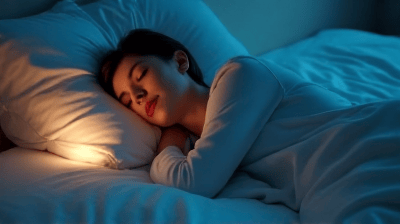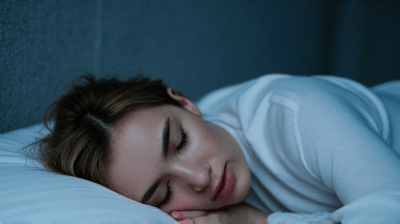
Understanding Sleep and Insomnia
The Importance of Sleep
Sleep is a fundamental biological process that allows the body and mind to rest, recover, and rejuvenate. During sleep, several vital functions occur:
-
Physical Restoration: Sleep helps repair muscle tissue, synthesize proteins, and release growth hormones, promoting physical recovery.
-
Cognitive Function: Sleep plays a critical role in memory consolidation, learning, and overall cognitive performance. Adequate sleep supports attention, problem-solving skills, and creativity.
-
Emotional Regulation: Quality sleep is essential for emotional well-being. Lack of sleep can lead to mood disturbances, increased stress, and heightened emotional reactivity.
-
Immune Function: Sleep is closely linked to immune health. During sleep, the body produces cytokines, proteins that aid in fighting infections and inflammation, contributing to overall health.
-
Metabolic Regulation: Sleep helps regulate hormones that control appetite and metabolism, making it essential for weight management and metabolic health.
What is Insomnia?
Insomnia is a sleep disorder characterized by difficulty falling asleep, staying asleep, or waking up too early and not being able to return to sleep. Insomnia can be classified into two main types:
-
Acute Insomnia: This type of insomnia is short-term and often triggered by specific stressors, such as life changes, travel, or external factors.
-
Chronic Insomnia: Chronic insomnia occurs at least three times per week for three months or longer, often related to underlying health conditions, psychiatric disorders, or lifestyle factors.
Causes of Insomnia
Understanding the underlying causes of insomnia can help individuals address the root issues affecting their sleep. Common causes of insomnia include:
-
Stress and Anxiety: Life stressors, such as work pressure, relationship issues, or financial concerns, can lead to racing thoughts and difficulty relaxing at night.
-
Medical Conditions: Chronic pain, respiratory issues, gastrointestinal problems, and hormonal changes can interfere with sleep quality.
-
Medications: Certain medications, including those for hypertension, asthma, and depression, may have side effects that disrupt sleep.
-
Caffeine and Alcohol Consumption: High caffeine intake or excessive alcohol consumption can negatively impact sleep quality and duration.
-
Poor Sleep Habits: Irregular sleeping patterns, excessive screen time before bed, and an uncomfortable sleep environment can contribute to insomnia.
-
Age: Sleep patterns often change with age, and older adults may experience more fragmented sleep or difficulty falling asleep.
Science-Backed Tips for Falling Asleep Faster
Now that we have a better understanding of sleep and insomnia, let’s explore practical, science-backed strategies to help you fall asleep faster and improve your overall sleep quality.
1. Establish a Consistent Sleep Schedule
One of the most effective ways to improve sleep quality is to establish a consistent sleep schedule. Going to bed and waking up at the same time every day helps regulate your body’s internal clock, or circadian rhythm.
Tips for Consistency:
- Choose a bedtime that allows for 7-9 hours of sleep, depending on your individual needs.
- Set an alarm for both bedtime and wake-up time to create a routine.
- Avoid sleeping in on weekends, as this can throw off your sleep schedule.
2. Create a Relaxing Bedtime Routine
A calming bedtime routine signals to your body that it is time to wind down and prepare for sleep. Engaging in relaxing activities before bed can help ease the transition into sleep.
Suggested Activities:
- Reading a book or listening to soft music.
- Practicing relaxation techniques such as deep breathing or gentle stretching.
- Taking a warm bath or shower to promote relaxation.
3. Limit Screen Time Before Bed
Exposure to screens before bed can interfere with sleep due to the blue light emitted by devices. Blue light suppresses the production of melatonin, a hormone that regulates sleep.
Recommendations:
- Aim to turn off electronic devices at least 30-60 minutes before bedtime.
- Consider using blue light filters or glasses if you must use devices in the evening.
- Choose non-screen activities for relaxation, such as reading a physical book or engaging in a hobby.
4. Optimize Your Sleep Environment
Creating an ideal sleep environment can significantly impact your ability to fall asleep quickly. Factors such as lighting, noise, and temperature play crucial roles in sleep quality.
Environmental Adjustments:
- Lighting: Make your room as dark as possible by using blackout curtains or eye masks. Dim the lights in the evening to promote melatonin production.
- Noise: Use earplugs or white noise machines to block disruptive sounds. Nature sounds or gentle music may also help promote relaxation.
- Temperature: Aim for a cool room temperature, ideally between 60 and 67 degrees Fahrenheit, as this range is conducive to sleep.

5. Watch Your Food and Drink Intake
What you consume throughout the day can significantly impact your sleep quality. Pay attention to your diet, especially in the hours leading up to bedtime.
Consumption Tips:
- Avoid Caffeine: Limit caffeine consumption in the afternoon and evening. Consider switching to herbal teas or caffeine-free alternatives.
- Limit Heavy Meals: Avoid large or heavy meals close to bedtime, as they can lead to discomfort and disrupt sleep. Aim to finish eating at least two to three hours before bed.
- Stay Hydrated: Drink enough water throughout the day but limit fluids in the hour or two before bedtime to reduce nighttime trips to the bathroom.
6. Engage in Regular Physical Activity
Regular physical activity is associated with improved sleep quality. Exercise can help reduce stress, promote relaxation, and boost overall mood. However, timing matters when it comes to exercise.
Exercise Recommendations:
- Aim for at least 150 minutes of moderate aerobic activity or 75 minutes of vigorous activity each week.
- Avoid vigorous exercise within one to two hours of bedtime, as it may be too stimulating. Opt for gentle activities such as yoga or stretching in the evening instead.
7. Manage Stress and Anxiety
Finding effective ways to manage stress and anxiety is essential for falling asleep faster. Engaging in relaxation techniques can help calm the mind and promote sleep.
Stress-Relief Techniques:
- Meditation: Practicing mindfulness meditation before bed can help quiet racing thoughts and promote relaxation.
- Deep Breathing: Implement deep breathing exercises to calm the nervous system and lower stress levels.
- Journaling: Writing down thoughts and feelings in a journal before bed can help clear your mind and create a sense of closure for the day.
8. Limit Naps
While napping can be refreshing, long or irregular napping during the day can disrupt nighttime sleep patterns. If you need to nap, limit it to 20-30 minutes earlier in the day.
Napping Guidelines:
- Set a specific time for naps and adhere to the time limit.
- Consider the timing of your nap; midday is generally the best time for a short nap.
9. Use the Bedroom for Sleep Only
Creating a mental association between your bedroom and sleep can enhance your ability to fall asleep faster. Avoid using your bedroom for activities other than sleep and intimacy.
Bedroom Usage Tips:
- Keep work and study activities outside the bedroom to reinforce the idea that the bedroom is a space for relaxation and sleep.
- If you find yourself lying awake in bed for more than 20 minutes, get up and engage in a calming activity until you feel tired. Return to bed when you feel sleepy.
10. Consider Sleep Aids Wisely
In some cases, individuals may consider using sleep aids, whether over-the-counter medications or natural supplements. While these can be helpful short-term solutions, it is essential to use them wisely and under the guidance of a healthcare professional.
Sleep Aid Considerations:
- Melatonin: A natural hormone that regulates sleep-wake cycles. Melatonin supplements may be helpful for adjusting sleep patterns, particularly for shift workers or those experiencing jet lag.
- Consult with a Doctor: Always seek medical advice before starting any sleep aid, especially if you are taking other medications or have underlying health conditions.
11. Seek Professional Help if Needed
If insomnia persists despite implementing these strategies, it may be helpful to seek professional help. A healthcare provider or sleep specialist can assess your situation, identify underlying causes, and recommend appropriate treatments.
Potential Treatments:
- Cognitive Behavioral Therapy for Insomnia (CBT-I): This evidence-based therapy focuses on changing unhelpful thoughts and behaviors related to sleep, helping individuals develop healthier sleep patterns.
- Sleep Studies: In certain cases, sleep studies may be conducted to monitor sleep patterns and diagnose sleep disorders.
The Role of Technology in Sleep Improvement
In today's digital age, technology can play a significant role in enhancing sleep quality. Several tools and devices are available to help promote relaxation and improve sleep hygiene.
Sleep Tracking Devices
Sleep tracking devices, such as smartwatches and sleep apps, can monitor sleep patterns and provide insights into sleep quality. These devices can help identify trends and patterns, enabling individuals to make informed adjustments to their routines.
Relaxation Apps
Numerous mobile applications offer relaxation and sleep assistance features, including guided meditations, soothing soundscapes, and bedtime stories. Consider exploring these options to find ones that resonate with you.
Smart Lighting
Smart lighting technology allows users to adjust the intensity and color of lights in their living spaces. Dimming lights in the evening and utilizing warm-toned lighting can create a calming atmosphere conducive to sleep.
White Noise Machines
White noise machines and apps produce consistent sounds that can mask disruptive noises, creating an ideal environment for sleep. These machines can be particularly helpful for individuals living in noisy urban settings.
Conclusion
Falling asleep faster and improving the quality of your sleep is achievable through science-backed strategies that address the underlying causes of insomnia. By prioritizing consistent sleep schedules, engaging in relaxation techniques, optimizing your sleep environment, and managing stress, you can create a foundation for restful nights and rejuvenating sleep.
As you incorporate these tips into your daily routine, be patient and allow yourself time to adjust. Sleep is a vital aspect of overall health, and nurturing your sleep habits can lead to lasting benefits for both your physical and mental well-being.



